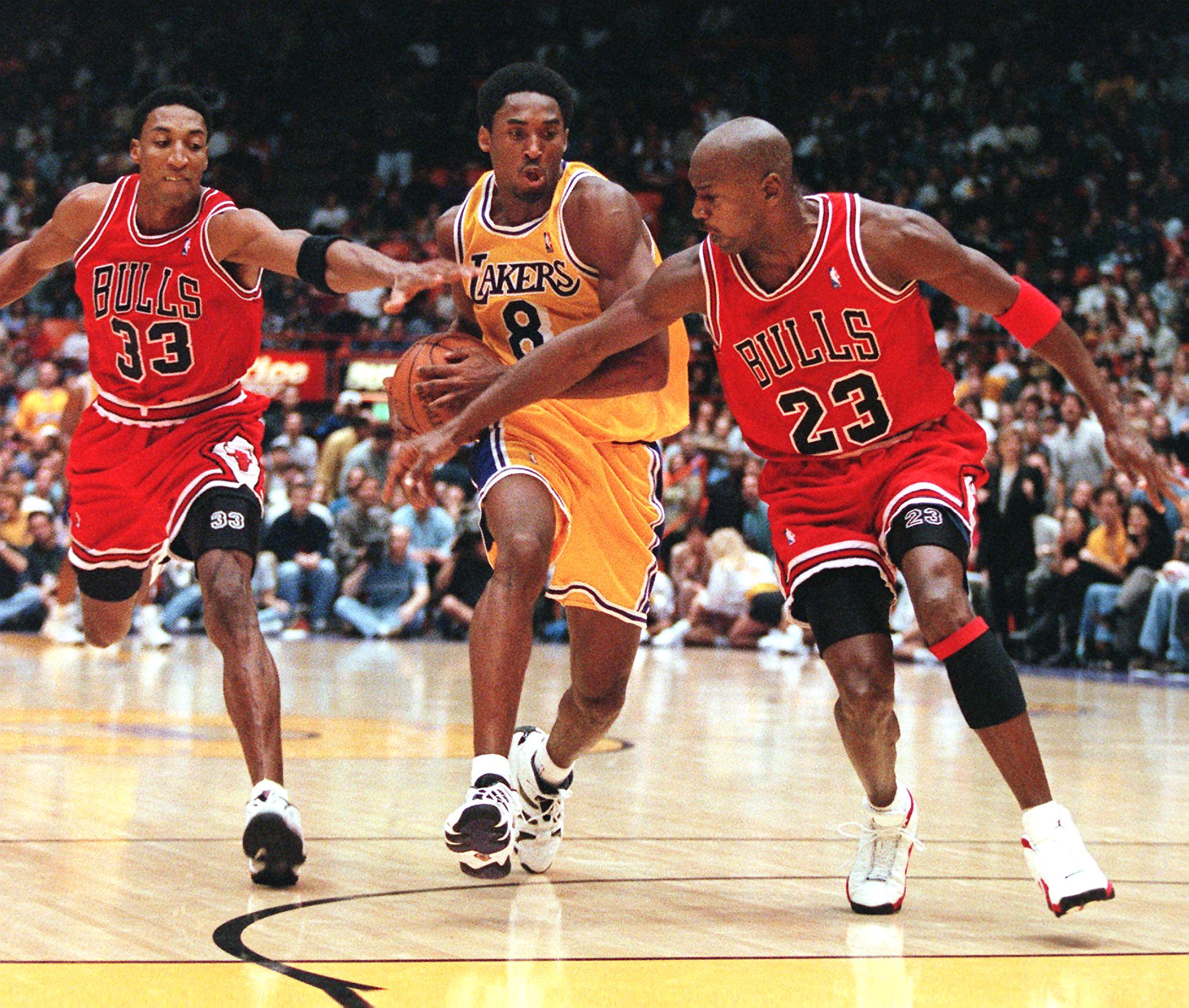Kobe Bryant, and the sad spectacle of sports gods turning mortal
Don't cry for the Black Mamba. He's still having a better finale than most.


A free daily email with the biggest news stories of the day – and the best features from TheWeek.com
You are now subscribed
Your newsletter sign-up was successful
Last month, Kobe Bryant announced his retirement from the NBA with a poem.
"We have given each other/All that we have," the Lakers superstar wrote in the Players' Tribune, shortly before divulging his plan to fade away before our very eyes in a season-long retirement tour. It might sound like an unlikely end for a guy who once nicknamed himself "Black Mamba," but Bryant is hardly the assassin he once was. Shooting about 100 percentage points below his career average from the field, he leads a team that is second only to the perpetually-tanking Philadelphia 76ers for worst record in the NBA.
Will his late career performance ruin the way Bryant will be remembered? It's doubtful. In fact, it might make him even more popular.
The Week
Escape your echo chamber. Get the facts behind the news, plus analysis from multiple perspectives.

Sign up for The Week's Free Newsletters
From our morning news briefing to a weekly Good News Newsletter, get the best of The Week delivered directly to your inbox.
From our morning news briefing to a weekly Good News Newsletter, get the best of The Week delivered directly to your inbox.
The fans are into it, with the woeful Lakers selling out on the road, and the artist formerly known as Mamba currently leading the All-Star voting over in-their-prime superstars like LeBron James and Stephan Curry. It's possible that the chance of seeing Kobe on the court in a Lakers uniform, humbled, has allowed fans that hated him for so long finally appreciate him for what he once was.
It's just the latest reminder that there's no perfect way to retire — even if there are plenty of cautionary tales.
Beloved superstars who stick around past their prime are often compared to "Willie Mays stumbling in the outfield for the Mets." The "Say Hey Kid" was a paradigm-shifting five-tool superstar for the New York and later San Francisco Giants, but when he finished his 22 year career with the New York Mets, he had the bad luck of playing in a nationally televised World Series game, where millions of people saw him stumble as he struggled to find a batted ball dropping from a hazy sky. That one flub became a cautionary tale for sports legends near the end of their time in the game: Don't be Willie Mays stumbling around in a Mets uniform.
Ken Griffey, Jr. seems to be a lock to be voted into baseball's Hall of Fame this year, his first on the ballot, but he definitely hung around too long. Injuries and time (still undefeated) relegated the MVP-winning "Kid," known for his ubiquitous smile and boundless talent, to a washed-up pinch hitter who reportedly napped in the clubhouse during games and retired unceremoniously, mid-season, after being benched by his manager. It seems Griffey got lucky. Because footage of his mid-game naps weren't broadcast on national television, he doesn't get the "Mays stumbling in the outfield" treatment.
A free daily email with the biggest news stories of the day – and the best features from TheWeek.com
Some athletes do more than just stick around too long. They retire, then unretire too many times.
Brett Favre was so desperate to avoid life after the game that he retired three times, each time putting a different team through Hamletian displays of indecisiveness. Michael Jordan also retired three times, in the last instance joylessly playing out a string of games for the hapless Washington Wizards. Jordan was still a legitimate All-Star in his final season, but many fans just couldn't get used to the idea of His Airness going out as a loser. Regardless, Jordan's still considered arguably the greatest basketball player of all time, and Favre's reputation took a far greater hit for his cellphone indiscretions rather than for his interminable comebacks.
Sometimes, holding on too long can be tragic. The great Muhammad Ali retired four times, the last one after suffering a 10-round defeat at the fists of Trevor Berbick in 1981. Ali was reportedly already suffering from Parkinson's Disease, making the beating he took that night in the Bahamas especially painful to watch in hindsight.
Often, fans simply prefer the symmetry of an all-time great playing his whole career with one team. Sure, nobody begrudged Hall of Fame outfielder Rickey Henderson the last decade of his playing career, when he seemed destined to have a stint with every team in Major League Baseball. But nobody could ever accept Johnny Unitas as a San Diego Charger or Joe Namath as a Los Angeles Ram.
Martin Brodeur locked up every meaningful record an NHL goalie could accrue in a career that included three Stanley Cup championships and five appearances in the Finals, all with the New Jersey Devils. But when the Devils made it clear he would no longer start for them, he hung around as a third string backup for a handful of games with the St. Louis Blues. To many hockey fans, it seemed weird and unfortunate for a player so inextricably linked to one franchise to go out with a whimper on another team, but less than a year later, the Devils have already announced they will retire his jersey and erect a statue of him, proving you can go home again and the former team will be happy to monetize the reunion.
And then there is Mr. Hockey himself. Gordie Howe so desperately wanted to stay in the game that two years after he concluded his 25-year Hall of Fame career, all with the Detroit Red Wings, he returned to minor league hockey for another seven seasons, plus one final swan song at the age of 52 with the Hartford Whalers in 1980. Not to content to rest on his considerable laurels, Howe came back for one more minor league shift in 1998 at the age of 60. Though it was obviously a shameless publicity stunt, Howe could now say he played professional hockey in six different decades. Nobody thinks any less of Howe because he hung around long after he was the best in the game.
Ultimately, the whole idea that there's a perfect way for a superstar athlete to retire is foolhardy. Sandy Koufax, Jim Brown and Barry Sanders all quit while still at the top of their games, but they went out so young that those retirements bear an aura of melancholy, with projections of what could have been forever consigned to imagination.
Perhaps the only all-time great who got to enjoy a Goldilocks retirement is John Elway. In his final game, John Elway won his second consecutive Super Bowl with the Denver Broncos, taking home MVP honors and putting the cherry on top of a Hall of Fame career previously overshadowed by three Super Bowl losses years earlier.
There's plenty of ways to say goodbye (sometimes more than once) and they're almost always under less-than-ideal circumstances. As a subpar player on a terrible team, Kobe Bryant won't be enjoying a Goldilocks retirement. But then again, Elway never got to enjoy a no-pressure lovefest of a retirement tour.
Anthony L. Fisher is a journalist and filmmaker in New York with work also appearing at Vox, The Daily Beast, Reason, New York Daily News, Huffington Post, Newsweek, CNN, Fox News Channel, Sundance Channel, and Comedy Central. He also wrote and directed the feature film Sidewalk Traffic, available on major VOD platforms.
-
 The 8 best TV shows of the 1960s
The 8 best TV shows of the 1960sThe standout shows of this decade take viewers from outer space to the Wild West
-
 Microdramas are booming
Microdramas are boomingUnder the radar Scroll to watch a whole movie
-
 The Olympic timekeepers keeping the Games on track
The Olympic timekeepers keeping the Games on trackUnder the Radar Swiss watchmaking giant Omega has been at the finish line of every Olympic Games for nearly 100 years
